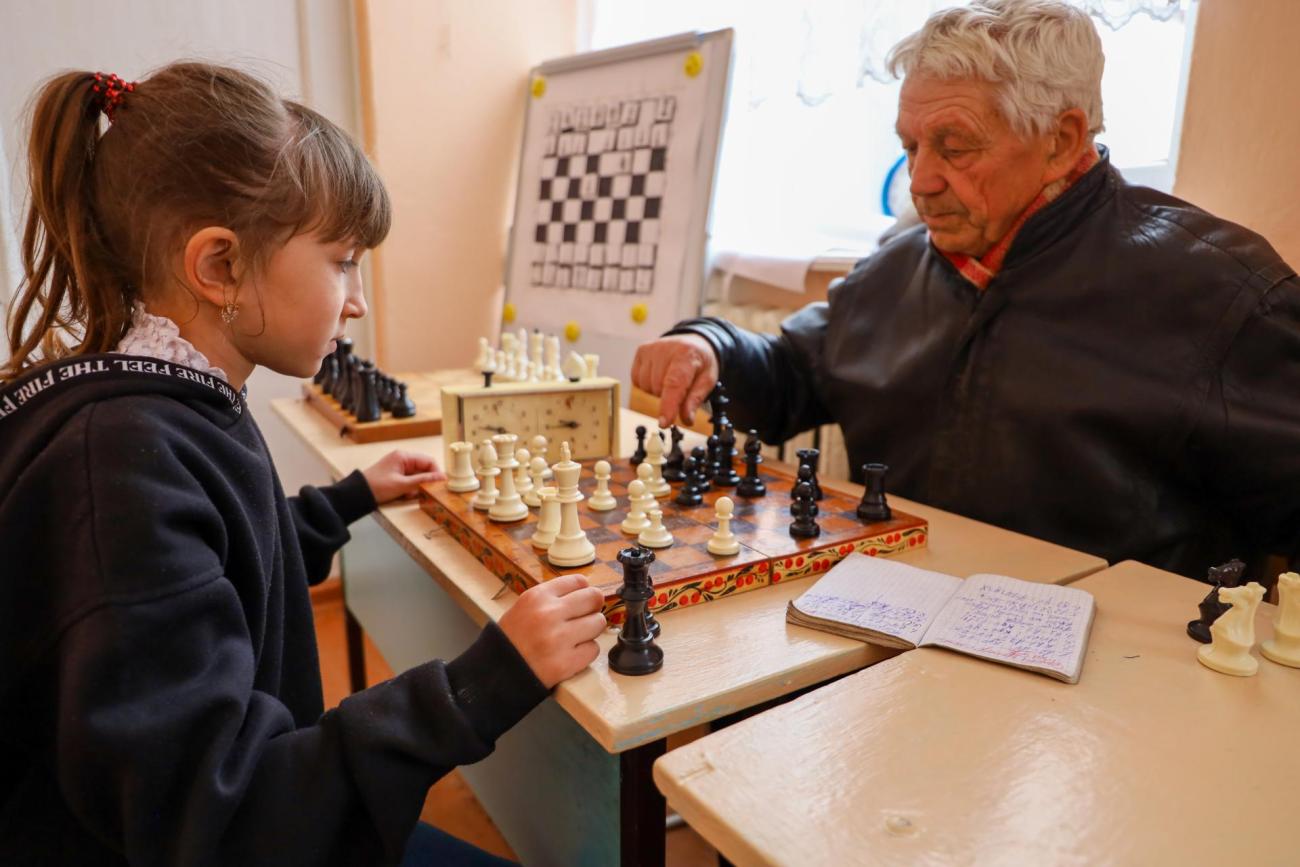Checkmate for Change: Be Inspired and Discover Sofronie on Volunteer Day

UNICEF urges everyone to engage in voluntary actions at the national or global level to make a change for development and social cohesion.
Behind a small door, you can hear the giggles of a child. If you open the door wider, you'll find Sofronie, a 76-year-old man, engaged in a fierce chess competition with Ionela, a nine-year-old girl. The room where they play is so narrow that it only fits a few tables arranged linearly and some chairs for children.
On the table, there are two chessboards with kings, queens, and knights alongside Sofronie's notebook and an old clock responsible for the time of each round. I closed the door to not disturb them, but after a few seconds, three boys arrived, waiting eagerly. They are fifth and sixth-grade students at the "Victor Coțofană" Theoretical High School from the Chetrosu village, Drochia district, located two hundred kilometres from Chisinau. Today, they have chess lessons with Sofronie.
The room doesn't look like a regular classroom. Every detail transforms it into a secret and unique space, an escape after mathematics, science, or Romanian lessons. Sofronie is a volunteer. His passion for chess gives him enough energy and creativity to live his age differently, surrounded by children and their desire to develop themselves: "I played chess in the tenth grade. Later, I studied at the Faculty of Mechanical Engineering in Chisinau, where I always played in the park. I was proud of my skills. Once, a man over 80, a former Moldovan champion, watched me win several games. He challenged me and beat me quickly. This experience motivated me to continue playing and keeping my spirit young."
Children from school who are curious about chess can find Sofronie after class hours. He is convinced that "chess is the most interesting game in the world" and that children deserve to know and enjoy the benefits of this game. "Through chess, they develop their ability to concentrate, memorize, and become more self-confident. Children get enormous pleasure when they win," shares the teacher proudly. "For instance, two little girls who started in the second grade learned to play quite well within a year, reaching the same level as boys who had been playing longer."
One of these girls is Ionela. She believes chess has helped her make new friends and get better results in math. "It's exciting. My dad encouraged me to play, telling me many smart people do so. I've been playing for a year and a half and have noticed better results in math. I want to be a doctor to help people," says Ionela.
After a few rounds with Ionela, Sofronie invites the three boys, eager for revenge after previous losses. Matei, 12, was inspired by his mother. "Chess is like a strategy for life. You think about how the opponent will move, how you will move. I enjoy it because it requires a lot of thinking and a good memory. At home, I play with my mother, and sometimes I win. She is a former chess champion," says Matei proudly.
Sofronie's joy knows no bounds when his students excel and win top places in various chess competitions. "We are motivated to be stronger and to win championships. Chess helps us develop our minds and gain self-confidence," says 12-year-old Bogdan. The main priority of Sofronie is to provide children with a tool to help them thrive. "Chess unites them. It's a game that fosters relationships. You can play and communicate with anyone, anywhere, even online," says the volunteer.
On International Volunteer Day, the United Nations Children's Fund (UNICEF) celebrates and promotes the recognition of the work and dedication that benefits the community and contributes to a better future for all. On this occasion, we encourage everyone to actively participate in volunteer actions at the national or global level, making a change that contributes to development and social cohesion.



